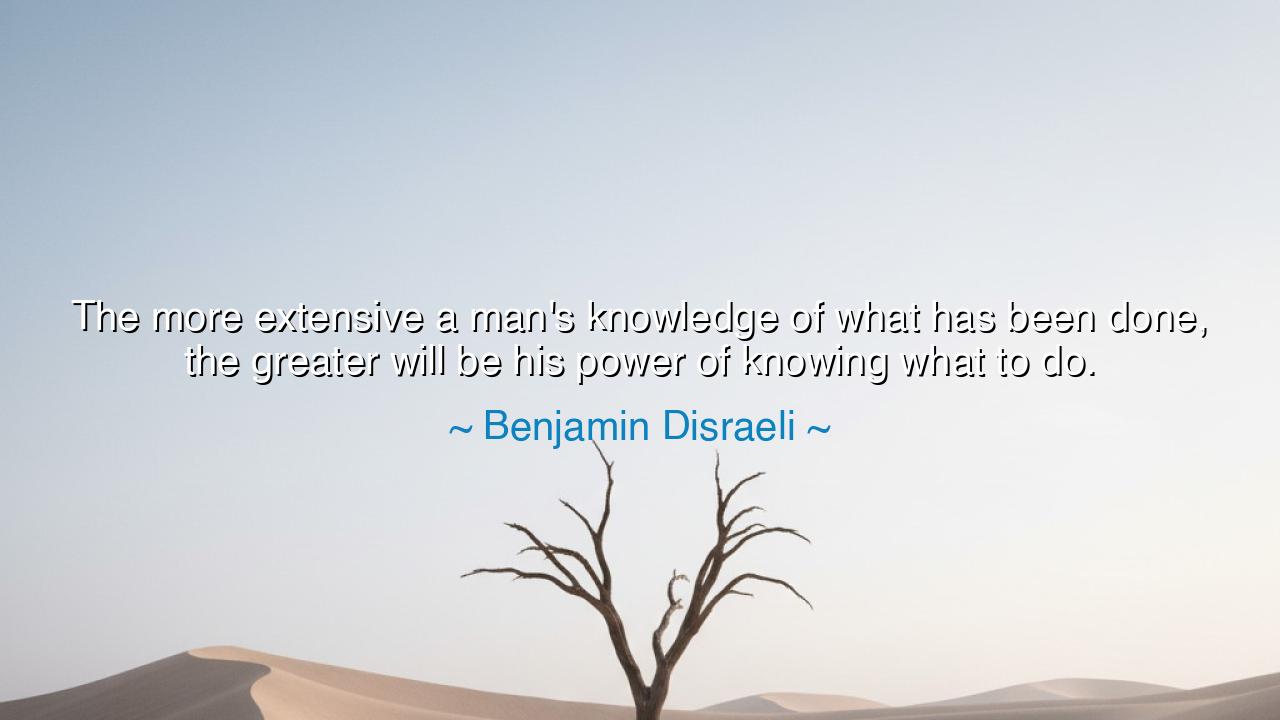
The more extensive a man's knowledge of what has been done, the
The more extensive a man's knowledge of what has been done, the greater will be his power of knowing what to do.






Hear the voice of Benjamin Disraeli, statesman and seer of the British Empire, who declared: “The more extensive a man's knowledge of what has been done, the greater will be his power of knowing what to do.” In this simple yet profound utterance lies a truth that has guided leaders, warriors, and thinkers across the ages: that the future is best navigated by those who understand the past. For every step we take is laid upon the stones of history, and only those who study those stones will know where to place their feet with wisdom.
For what is knowledge of what has been done but the inheritance of all human experience? Battles fought and lost, empires risen and fallen, inventions born of struggle, and philosophies tempered in fire—all these form a treasury for the discerning mind. To ignore them is to wander blind, repeating the mistakes of those who came before. But to draw from them is to possess foresight, to see patterns and consequences hidden from the unlearned. Thus Disraeli teaches us that power in decision comes not from instinct alone, but from the wisdom of memory.
The ancients knew this well. Thucydides, in his history of the Peloponnesian War, did not write merely to recount events, but to provide “a possession for all time.” He believed that by studying what had been done, future generations would understand better what to do in their own conflicts. Similarly, the Romans revered their historians not as mere chroniclers, but as teachers of statecraft. For to know how Hannibal had marched, how Caesar had conquered, how republics had failed, was to be armed with wisdom in the face of new challenges.
History offers a clear example in the figure of Abraham Lincoln. When confronted with the secession of the Southern states, he did not act rashly or without grounding. Instead, he studied deeply the founding documents of America, the lessons of past compromises, and the writings of the Founding Fathers. His knowledge of what had been done—how the Union was formed, how it had been preserved through lesser crises—gave him the vision to act wisely in the greatest of national trials. It was this knowledge that enabled him to hold the Union together and strike the chains from millions of enslaved.
The deeper wisdom of Disraeli’s saying is that knowledge multiplies choices. The ignorant man sees only one path before him; the wise man, who knows history, perceives many. He knows where roads have led others astray, and where they have led to glory. This does not guarantee success, but it grants clarity, and clarity is the compass of power. Thus, the study of history is not a pastime, but a weapon—a shield against folly and a sword for wise action.
The lesson for us is clear: seek out the stories of what has been done. Do not live only in the present moment, as though you were the first to struggle, the first to dream, the first to suffer loss. Others have walked this road before you, and their footsteps are guides. Read, listen, observe, and draw from the deep well of human experience. For the broader your knowledge, the sharper your power of action will become.
Practical action flows from this wisdom: study history, both great and small. Learn from the mistakes of nations, but also from the struggles of your family, your community, your craft. Keep a humble heart that asks: “Who has faced this before me? What did they do? What can I learn?” And then act with courage, knowing that you carry not only your own strength, but the distilled strength of generations past.
So remember Disraeli’s wisdom: the more extensive your knowledge of what has been done, the greater will be your power of knowing what to do. Fill your mind with the lessons of history, and your decisions will carry the weight of centuries. In this way, you will not merely act—you will act with wisdom, with foresight, and with the power that comes from standing upon the shoulders of those who came before.






AAdministratorAdministrator
Welcome, honored guests. Please leave a comment, we will respond soon